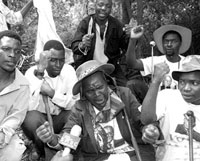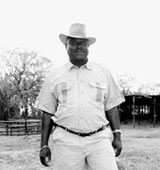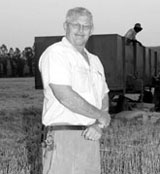Press delegation’s visit to Zimbabwe fulfills a promise
Visit to war memorial a blessed moment

HARARE (FinalCall.com)–On a long stretch of rural road that cuts through vast open countryside outside the capital city, Menard Muzariri and Alan Graham live just miles from each other but are otherwise worlds apart.
Mr. Muzariri, 48, a Black farmer who acquired his land last December, is just getting started in what he hopes will be a bright future of raising cattle and growing food to feed the citizens of this southern African nation and for export.
Mr. Graham, a White farmer who came to this country when he was eight-years-old, has a future that is up in the air, hinging on a decision that can come at any moment from the government that will determine how much of a future he has in farming–at least in Zimbabwe.
It is this land dilemma for Whites and Blacks that has this nation at the center of controversy in the world’s eye and has catapulted President Robert Mugabe to pariah status in the western press.
“Everything has got a background,” Mr. Muzariri says, addressing a delegation of 38 journalists and religious leaders from America who visited his sprawling farm.
“Zimbabwe is born out of a bitter war. So people should ask themselves, why did the people decide to go to war? It is because the land had been taken away from them?”

The “background” Mr. Muzariri refers to is the colonization of his country in the late 1800s by the British. In 1895 colonizer Cecil J. Rhodes proclaimed the land Rhodesia. Shortly thereafter, the first short-lived Chimurenga, or “War for Liberation,” ignited. By 1966, the second Chimurenga began and was not to be denied. Independence was gained in 1980.
“I am a war veteran,” Mr. Muzariri proclaims, proudly displaying the letters ZALA branded onto his arm. “I participated in the liberation war.”
Mr. Graham, a man in his early 50s, doesn’t talk much about the “background” initially. He’s more preoccupied about his immediate future.
He is harvesting a crop of wheat, overseeing the 150 Black farmhands who work his farm when the delegation of Black journalists from the United States approach him.
“As far as I know, that was before my time,” he says when asked about the background that Mr. Muzariri talks about. But later he admits, “I have to live with the situation created by my ancestors.”

Mr. Graham may have to pay a high price, just as Blacks paid a high price when they were violently driven off the most fertile areas of their land and subjugated on land mostly unfit for farming.
Any day now he will get word from President Robert Mugabe’s land minister on whether or not he will be allowed to continue to farm. He has met with representatives of the government and has offered to give up 184 hectares, about 457 acres, of his 584 hectare, or 1,442 acre, farm. Large commercial farms are limited to 400 hectares, or 988 acres, according to Mr. Graham.
“I’ve been told verbally that my offer has been accepted; we have nothing in writing,” he says. “Without a document from the Ministry of Agriculture, the banks won’t lend us money. Right now we are in October, our season is starting, it’s a difficult time. We don’t know quite where we are, whether to move forward or not.”
A dark history
Back in 1888, Cecil Rhodes led a colonial movement across South Africa into Zimbabwe, setting up mining operations from Cape Town to beyond Harare. In 1893, King Lobengula fled as British forces invaded Zimbabwe and by 1895, the colony established by Mr. Rhodes became known as Rhodesia, launching a nightmare of tyranny for Mr. Muzariri’s ancestors and the indigenous population.
After the first “War for Liberation” was crushed in 1897, British settlers flooded the region and by 1923 the British Crown became the sovereign of Rhodesia.
Over the next 11 years, Blacks were legislated off all fertile land through the Land Apportionment Act. Labor laws excluded Blacks from skilled professions and banned them from White areas.
Black anger and resistance boiled. Black activism led to the establishment of the African National Congress in 1957, and the Zimbabwe African People’s Union (ZAPU) and the Zimbabwe African National Union (ZANU) were formed in 1961.
Meanwhile, the new Rhodesia distanced itself from England, issuing the Unilateral Declaration of Independence in 1965. It was during these years also that leaders of the future “War for Liberation”–men like Joshua Nkomo and Robert Mugabe–were being shaped and fashioned into revolutionaries.
In 1966, ZANU guerrillas attacked Rhodesian forces at Chinhoyl, about 100 miles west of Harare, thus launching the second Chimurenga. In 1980, Mr. Muzariri and other war veterans celebrated Zimbabwe’s independence.
As liberation fighters neared certain victory, the British Crown offered to negotiate peace and during a meeting in London the Lancaster Agreement was drafted.
Under the Agreement, the new government was forbidden to take any privately-owned farms from Whites for a period of 10 years. Meanwhile, England and the United States agreed to start a process of purchasing land from White farmers to resettle Blacks. However, England reneged on her promise, freezing the funds in 1990, making it difficult for Mr. Mugabe–who had become president–to resettle landless Blacks.
“The government kept telling the people to wait,” said Mr. Muzariri, “but until about 1997, the money never came and the British had the guts to tell our government they were not going to honor (the agreement). It was at that time that our people went back to the drawing board.”
War veterans began to stage takeovers of White-owned farms. Their actions forced Mr. Mugabe to back the effort and legislate a “fast pace” land reform program that ultimately lead to the jailing this year of White farmers who refused to vacate their land as ordered by new law.
Only a matter of time
Mr. Mugabe has been accused by his detractors of orchestrating the war vet takeovers as a means of extending his rule. He was elected prime minister in 1980 and elected as the country’s first president in 1987. He won re-election earlier this year.
But Mr. Mugabe’s supporters contend that vets’ actions were spontaneous and borne out of frustration. They say a handful of White farmers, roughly 4,900 of them, owned 70 percent of the arable land and many Whites owned more than one farm. The war vets grew tired of seeing good farmland go unused because the farms were too big for the farmers to fully utilize.
“There’s been so much land available for farming but some of it has been idle,” says Fungayi Simbi, marketing director for Agricultural and Rural Development Authority (ARDA) and a former seed salesman for U.S.-based Cargile Co.
“Now it’s really necessary to free some land to people who can use it because the initial land distribution (by Whites) targeted land with poor soil. My personal view is Whites were holding too much land. And a lot of crop was targeted for export because it was much more lucrative.”
Min. Akbar Muhammad, international representative of the Nation of Islam and leader of the press delegation, warned that the reason the West is so angry at Mr. Mugabe is that his act of justice in resettling the land might catch on in other southern African nations where White settlers still own most of the arable land.
Recently, Namibia’s Foreign Minister Hidipo Hamutenya said his government is frustrated with the slow pace of land transfers under his country’s reform program that depends on a “willing seller, willing buyer” policy.
“It’s only a matter of time that this call for justice will spread and get louder,” Min. Muhammad said. “The best policy for the White settlers would be to act accordingly with justice.”
He also warned that Black America should not be duped by media that portrays White farmers as being thrown off their land, and that they read between the lines when they see opposition parties in Zimbabwe that are sponsored by England and the United States.
The first phase of Mr. Mugabe’s land reform program allocated small plots to vets that allows them to produce food for their own families. Phase 2 calls for preservation of the commercial farm status through allocating small, medium and large plots.
The government identified Whites–many of whom owned large tracts of land or more than one farm–and negotiated a division of the land or ordered them off the land if they owned more than one farm.
The process of resettlement
An application process for Blacks was implemented and candidates for farms were chosen on qualifications such as their ability to manage the land and their resources. Out of some 92,000 applicants for the Phase 2 process, 52,000 of them qualified, according to Mr. Muzariri.
Rev. Al Sampson, another member of the delegation and an activist for Black farmers in America, says he’s impressed by the “process” of Mr. Mugabe’s land reform.
“The process for acquisition is under the rules of equity first, and second is that the process has integrity,” he told The Final Call, referring to the application process and examination of qualifications of candidates.
Min. Muhammad added that he was touched by the opportunity now being afforded to people who live in poverty and virtually in communal camps.
“What I saw is a man who left his father’s farm at the age of 18 to fight in the liberation war. He never lost his ability to farm and unless this land reform was implemented, he never would have gone back to the land,” he said about meeting Mr. Muzariri.
“The outside world must understand this and not cause additional suffering to people who already suffer by linking sanctions on Mugabe just because the West doesn’t like his bold moves. Drought and AIDS have already plagued the country. They don’t need a third plague, which is isolation,” he said.
Mr. Muzariri’s farm consists of 467 hectares, about 1,153 miles. The arable land consists of about 600 miles. The rest is used to feed his 200 head of livestock. But he says he faces the same problems that many resettled farmers face, the main problem being the lack of equipment.
He explained that many of the White farmers destroyed equipment and irrigation systems prior to turning over the land to the Blacks, including the farmer who previously owned the farm he now tills.
“Are they engaged in a land reform program? The answer is no. It is natural drought that has hit southern Africa,” he says.
Mr. Graham’s farm consists of 1,442 acres, just over half of which is suitable for farming. He grows cotton, maize, soybean, wheat as well as raises cattle. He says he’s willing to cooperate with the program although he resents it because he paid for his farm after independence when he brought it from a White farmer.
“This land issue has gotten slightly out of control. A lot of (Whites) who lost farms should still be on it,” he says.
But Mr. Simbi notes that the government tried on many occasions to negotiate with the White farmers.
“It’s well documented there have been several attempts made by government to discuss this with the commercial farmers. If commercial farmers were more prudent in their vision and foresight they could have engaged in negotiations much earlier to allow a smoother transition,” he said.
Mr. Simbi said he expects food production to decline for a few more years but it will rebound once the land is fully settled and the farmers gain access to equipment and gain more experience handling large tracts of land.
“It’s a big challenge for the nation, but a lot of our people were providing the labor to help the commercial farmer so they have the knowledge to farm.
“You need to organize; you need equipment; you need finance. It will take three years to get back to normal,” he said.
Mr. Graham concedes that “there certainly is cause for redistribution of land,” even though he says “hatred” has come into the whole redistribution process.
“Britain should honor its commitment. We must find a way to go forward,” he said.
Members of the delegation included Lorenzo Martin of the Chicago Standard; Sylvia Perry, Jacksonville Free Press; Rosalind Bacon, Sarasota Bulletin; Shantella Sherman, Philadelphia New Observer; Alice Tisdale, Jackson (Miss.) Advocate; Todd Burroughs, writing for the National Newspaper Publishers Assn.; senior media consultant Bill Cherry and pastors Al Sampson of Chicago and Rev. Carl Kennedy of Durham, N.C.












